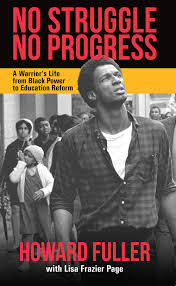 In 1998, at a luncheon in Chicago, former superintendent, activist and now-icon Howard Fuller was on an education panel with an up-and-coming state senator. Barack Obama told the audience that vouchers were a “distraction,” and said those who support them don’t want to tackle the difficulties of changing the “entire system.”
In 1998, at a luncheon in Chicago, former superintendent, activist and now-icon Howard Fuller was on an education panel with an up-and-coming state senator. Barack Obama told the audience that vouchers were a “distraction,” and said those who support them don’t want to tackle the difficulties of changing the “entire system.”
Fuller laments the spectacle of black leaders going toe to toe in public, but he did not shy from a retort. As he recalls in his just-released autobiography, “No Struggle, No Progress,” he answered from experience about teachers unions’ resistance to change, then lowered the boom:
“And you sit here and claim that we can make changes in the existing system? If you can do that, God bless you. But I’m going to tell you this. Those of us who are out there fighting are not going to wait for you to do that. We’re going to keep trying to find ways to help people whose kids are being undereducated, miseducated, not educated.”
Howard Fuller’s passion for parental choice is common knowledge in choice circles. He is arguably the best known and most revered figure in that realm. But thanks to his book, a wider swath of people will get a chance to meet him. Written with noted author Lisa Frazier Page, the book would compel even if school choice wasn’t such a hot topic; it chronicles an extraordinary American life. But it has the potential, too, of knocking a few more holes into the tired narratives about choice supporters and what motivates them.
Low-income parents are lining up in droves for alternatives to district schools, and one prominent Democrat after another is swinging towards them, including President Obama who, while still hung up on vouchers, wholeheartedly supports charter schools. The Dem divide is real, and as it grows, more rank-and-file Democrats will have second thoughts. Fuller’s story can hasten the process. Politically, he’s part of the same extended tribe, and for many folks that external validation makes all the difference.
It wasn’t until after he embraced vouchers in the late 1980s, Fuller notes, that he heard of economist Milton Friedman. Fuller’s views about education and everything else were forged in a different world: through his own humble upbringing by strong black women who found ways to get him the best education possible (including stints in Catholic schools); and in the tumult of the 1960s – in civil rights and Black Power, in protest marches and rent strikes.
It’s clear from every page that Fuller is motivated by love for “my people,” and for finding ways to right wrongs and uplift them. “No Struggle, No Progress” is brimming with passages that speak to his heart – passages like this one, where Fuller describes one of the Durham, N.C. neighborhoods he was assigned to help as a community organizer in the 1960s:
“Though I’d grown up in public housing and spent my earliest days in a poor southern community, I’d never seen poverty and neglect like this. Hayti, the largest neighborhood in my target area, sat in the heart of a major city, yet some areas still had dirt streets. Dirt streets! In the middle of town! That was incomprehensible to me. Shotgun shacks were everywhere, and some of them had no running water indoors. My heart hurt when I saw how my people were living and how they had accommodated themselves to survive under conditions that no human being should have to endure. Anger burned deep inside. But far from feeling overwhelmed, it made me even more determined to figure out how to change the condition.”
Early on, Fuller was captivated by another concept too: “maximum feasible participation.” (more…)
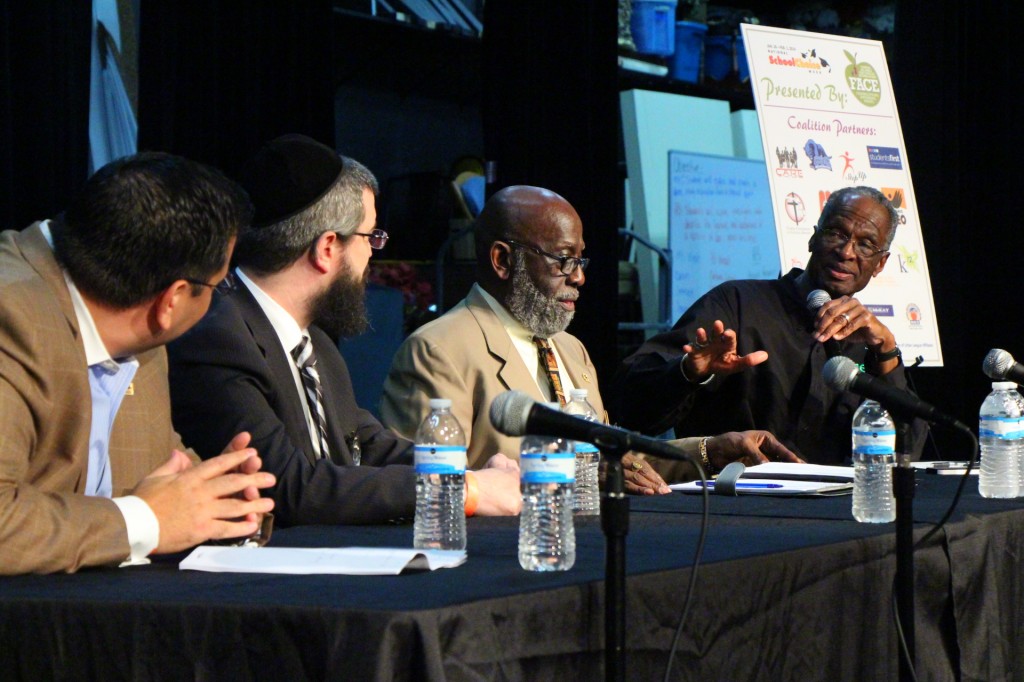
From left to right: Julio Fuentes with HCREO; Rabbi Moshe Matz with Agudath Israel of Florida; T. Willard Fair of the Urban League of Greater Miamii; and BAEO's Howard Fuller. (Photo by Silver Digital Media)
It’s an increasingly common refrain: school choice is an extension of the civil rights movement. But two of the choice movement’s elder statesmen took exception to that description at a National School Choice Week event Thursday night.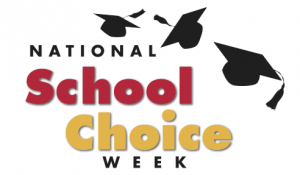
The civil rights movement was broader than the battle for school choice, and every generation ought to define its own movements, said Howard Fuller, a legend in the choice movement and chair of the Black Alliance for Educational Options. Also, attempting to link the two can create friction and arouse suspicions when it’s used by choice supporters who may not see eye-to-eye on other issues important to civil rights veterans and their supporters.
“Just even using that terminology gets us into arguments that we don’t need to be in,” Fuller said.
T. Willard Fair, a former chairman of the Florida Board of Education, raised another objection: When it comes to school choice, too many black leaders are not on the same page.
“During the civil rights movement, no black elected official dared to stand up and be against this,” said Fair, who co-founded Florida’s first charter school. “If he or she did, we would get them.”
The spirited comments from Fuller and Fair, and polite comebacks from other school choice leaders, came during Florida’s “spotlight” National School Choice Week event. About 200 people attended the event, held at Coral Springs Charter School near Fort Lauderdale. It was organized by the Florida Alliance for Choices in Education, an umbrella group for a wide range of pro-school-choice organizations, including Step Up for Students, which administers the state’s tax credit scholarship program and co-hosts this blog.
The back-and-forth over civil rights and school choice was spurred by the event’s theme. This year is the 60th anniversary of the historic Brown v. Board of Education decision, which declared separate schools for black and white students unconstitutional. Many school choice supporters see a connection between the barriers knocked down then and those falling now. (more…)
In the 60 years since the landmark Brown v. Board of Education decision, the mission to offer every student equal access to a free and quality public education has made great strides. But there’s more work to do, say education advocates gathering this week for National School Choice Week.
More than a dozen groups representing everything choice - from charters to religious schools to district virtual schools – will meet Jan. 30 in Coral Springs, Fla., for a panel discussion reflecting on the historic Supreme Court ruling and whether its vision is being fulfilled.
Brown was an important part of the struggle to end legal discrimination but today "we have a different problem," longtime school choice supporter Howard Fuller said in an email to redefinED. "Children of low income and working class Black families are trapped in schools that are not providing them with a quality education. Integration is not the lever of power that is needed at this point in history."
The Florida event is one of 5,500 taking place during the fourth annual celebration of educational opportunity.
Speakers include Fuller, a distinguished professor and board chairman of the Black Alliance for Educational Options; Georgia Rep. Alisha Morgan, a Democrat and school choice supporter; T. Willard Fair, a civil rights activist and the youngest chapter president in the history of the Urban League; Julio Fuentes, president of the Hispanic Council for Reform and Educational Options; Rabbi Moshe Matz, director of Agudath Israel of Florida; Vincent Boccard, mayor of the city of Coral Springs; and Jonathan Hage, founder, president, chairman and chief executive officer of Charter Schools USA.
The event is hosted by Florida Alliance for Choices in Education (FACE), a roundtable of school choice and parental empowerment organizations that work to expand and strengthen educational options. Partners include Step Up For Students, the nonprofit that administers the Florida Tax Credit Scholarship (and co-hosts this blog); Florida Charter School Alliance; PublicSchoolOptions.org; Charter Schools USA; Coral Springs Charter School; Florida Virtual School; McKay Coalition; HCREO; Agudath Israel of Florida: StudentsFirst; Pasco eSchool; National Institute for Educational Options; and K12 Inc.
The event will be held at the Coral Springs Charter School, 3205 N. University Drive, Coral Springs, 33065. The reception starts at 5:30 p.m. with the discussion at 6:15 p.m. For more information, email FACE director Wendy Howard, wendy@flace.org
You’ll be able to watch a live webcast of the event here on the blog. You can also follow via Twitter @redefinedonline. Search for #SCW and #FLchoice.
 This week, we posed that question to many of you on Twitter and got an amazing response: more than 1,000 tweets!
This week, we posed that question to many of you on Twitter and got an amazing response: more than 1,000 tweets!
In the meantime, we also posed it to some stalwarts in the school choice movement, and asked them to write a short blog post in response. Next week, we’ll begin publishing their fun, thoughtful and provocative answers.
Here’s the all-star line-up:
Monday, Dec. 23: Jon Hage, founder and CEO of Charter Schools USA.
Tuesday, Dec. 24: Robert Enlow, president and CEO of the Friedman Foundation for Educational Choice.
Thursday, Dec. 26: Joe McTighe, executive director of the Council for American Private Education
Friday, Dec. 27: Dr. Howard Fuller, board chair, Black Alliance for Educational Options
Monday, Dec. 30: Julio Fuentes, president and CEO, Hispanic Council for Reform and Educational Options
Tuesday, Dec. 31: Peter Hanley, executive director, American Center for School Choice
We hope you enjoy the posts as much as the #schoolchoiceWISH event. It was a hit! (more…)
Editor's note: This piece is in response to the U.S. Department of Justice's legal action against the voucher program in Louisiana. It is co-authored by Howard Fuller, board chairman of the Black Alliance for Educational Options, and Kevin Chavous, executive counsel of the American Federation for Children.
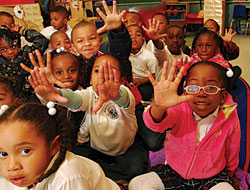
Fuller and Chavous: The DOJ has wrongly decided that allowing these children a life line to getting a better education must take a back seat to whether or not they impact desegregation. (Image from baeo.com)
It is easier to say we must take the long view when grappling with the issue of social justice than it is to actually practice it. Such is the problem the U.S. Department of Justice (DOJ) has today as it wrongly inserts itself in the effort to give low-‐income children in Louisiana an opportunity to get a better education. DOJ is suing the state of Louisiana, more specifically 34 parishes in the state that are still under a desegregation law, claiming that the state’s school choice scholarship program unlawfully allows students to leave failing public schools and go to high-‐performing private schools by way of a scholarship. DOJ thinks it’s wrong and illegal to allow that to happen.
When one takes the long view, it’s necessary to understand the moment in history in which you exist and what is the primary problem being faced at that particular moment in the continuum of the struggle for social justice over time.
In America today the primary problem facing children from low-income and working class families is getting a quality education. The Louisiana Scholarship Program was created to give these students a way to escape failing schools. It allows them to apply for a scholarship and choose a school that for them holds the promise of a better education.
The DOJ has wrongly decided that allowing these children a life line to getting a better education must take a back seat to whether or not they impact desegregation. No one with any sense of history will deny that at one point in time the state of Louisiana used this power to fund schools that were for whites only.
But that was then and this is now. In this instance, the state of Louisiana is on the right side of history because its actions are giving children the best chance to ultimately participate in mainstream American society by giving them access to better educational opportunities. (more…)
Fifty years ago next week, Dr. Martin Luther King Jr. delivered his “I Have A Dream” speech to 250,000 people in Washington D.C. It remains one of the greatest speeches in American history, offering a sweeping vision of hope and equal opportunity in the midst of so much fear and turbulence.
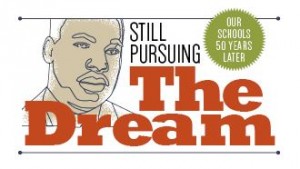 Many of us will reflect on how far we have come, and how far we have to go, since Dr. King energized millions with his words - and there’s no doubt education will be part of those discussions. To that end, we’re running a series of posts next week on the Dream and our schools.
Many of us will reflect on how far we have come, and how far we have to go, since Dr. King energized millions with his words - and there’s no doubt education will be part of those discussions. To that end, we’re running a series of posts next week on the Dream and our schools.
We asked our bloggers to consider a scenario described by education leader Howard Fuller: On Feb. 1, 1960, four black students sit down at a lunch counter in Greensboro, N.C. and are denied service. They spark the lunch counter movement, helping to focus the nation’s conscience on racial segregation. Now, four black students sit down at a lunch counter and they’re welcomed like other diners. But they can’t read the menu.
What do racial achievement gaps say about the state of Dr. King’s dream? How does our current education system expand or contract his vision of social justice and equal opportunity? Is there reason to be hopeful when it comes to school choice, educational quality and the academic success of low-income and minority children? Please join us, beginning Monday, to read what some of our bloggers have to say. And please add your thoughts to the discussion.
Only 76 miles separate the Step Up For Students office in Tampa and the Orlando hotel where the Black Alliance for Educational Options held its annual symposium last week. But my Corolla must have hit a black hole on I-4, because I landed on another planet.
I didn’t see anybody from the American Legislative Exchange Council on Planet BAEO. But at lunch, I did sit next to a sad-eyed woman from Kentucky whose grandson recently graduated from high school even though he can’t read.
I didn’t see anybody itching to privatize public schools. But I did learn about Papa Dallas, a black man whose eyes were burned out as a slave because he was caught learning the alphabet.
I didn’t see the Koch Brothers. But I did see, just minutes after arriving, an image of black men hanging dead from a tree while a crowd of white people loitered.
I learned as a reporter, years before joining Step Up, what BAEO was about. But it was still jarring to see, up close, how much reality clashes with “the narrative.”
The symposium drew 650 people from 20 states, including 50 current and former elected officials, the vast majority of them Democrats. All night Thursday and all day Friday, I heard them talking parental empowerment, black empowerment, achievement gaps, equal opportunity. I heard a lot of thoughtful, passionate people. I heard frustration and desperation too. If it was all a front for profiteers, then BAEO orchestrated more actors than a Star Wars flick.
Critics “call me a corporate reformer all the time,” said Sharhonda Bossier, a former public school teacher who helps lead Families for Excellent Schools, a school choice group based in New York City. “I’ve been told that I’m being duped. I’ve been told that I have an interest in undermining the black middle class. I’m like, ‘Are you looking at me?’ “ (more…)
Count legendary school choice activist Howard Fuller among those who don’t have a problem with for-profit entities in education reform.
At the Black Alliance for Educational Options symposium in Orlando on Thursday, Fuller, who is BAEO’s chair, told several hundred participants at a first-timers orientation that “you also need to not have, at least in my opinion, a knee-jerk reaction to for-profits.”
“At the end of the day, judge something by what it does,” he said. “Don’t start by judging the label.”
The participation of for-profit companies is often raised by critics in parental choice debates on everything from virtual and charter schools to parent triggers and tutoring providers. It's also an issue to some extent within the choice community. A few months ago, Rick Hess from the American Enterprise Institute and Ben Austin with Parent Revolution engaged in a back-and-forth on the issue after Austin suggested nonprofits are more likely to put children first.
Fuller weighed in after letting attendees know BAEO supports effective public private partnerships. Here’s the full text of his remarks, as best as I could hear them: (more…)
Elected black Democrats who support vouchers and charter schools are slowly but surely finding themselves less isolated. And for that, they can thank relentless parents, said Kenneth Campbell, president of the Black Alliance for Educational Options.
The tide is changing because of “this constant drumbeat that they’re hearing from parents about how much their kids are struggling,” Campbell told redefinED in the podcast interview attached below. “More and more people are just coming to this realization that even if I don’t necessarily like the people that are proposing this, we don’t have any other options. And we’ve heard that time and time again, as we’ve gone out and worked with elected officials - that we can’t ignore the pleas of our parents anymore.”
Campbell offered his comments on the eve of BAEO’s annual symposium, which is being held today through Saturday in Orlando. The largest gathering of black school choice supporters in the country will draw 650 people this year, including 50 current and former elected officials. It comes amidst head-spinning ferment on the choice front, with states as disparate as Louisiana, Washington and New Hampshire passing historic measures in the past year alone.
“There are a lot of people in our community who are rightfully concerned and skeptical about motives, and about is this the right thing to do,” Campbell said. “But I think increasingly, we have reached the point where there’s no excuse for not acting with urgency in giving kids and parents options.”
BAEO has been a leading voice for parental school choice since it formed in 2000. Its ranks include a number of leading reformers, including Howard Fuller, Kevin Chavous and T. Willard Fair, who co-founded the first charter school in Florida and served as chair of the state Board of Education.
Florida is an apt place for the group to meet. (more…)
A recent headline in the Charlotte Observer offers inspiration this season. “Compete and cooperate,” the newspaper wrote of charter, district and private schools there, “A new direction for Mecklenburg schools.”
 This is not a fictional account and it turns on a basic truth about education reform: Despite the caverns that sometimes separate those who are loyal to the great institution of neighborhood schools and those who fight to expand the menu of learning options, the collective effort is still pulling in the same direction. Both believe in the social necessity of public education and both want to give every child the best chance to succeed.
This is not a fictional account and it turns on a basic truth about education reform: Despite the caverns that sometimes separate those who are loyal to the great institution of neighborhood schools and those who fight to expand the menu of learning options, the collective effort is still pulling in the same direction. Both believe in the social necessity of public education and both want to give every child the best chance to succeed.
So allow me to wish this season for fertile and productive common ground, and begin it with a salute to Kevin Welner, professor of education and director of the Education and the Public Interest Center at the University of Colorado at Boulder. His center is known for its allegiance to traditional schools and its steadfast rejection of most, if not all, alternatives to them. Welner is known, in part, for a book that treats tax credit scholarships for low-income schoolchildren as an assault on public education, that dismisses them as “a distraction away from proven solutions and real needs,” and includes the memorable line: “The inherent value of choice should … not be overstated.”
Needless to say, Dr. Welner has a different definition of public education than suits my tastes, but his recent column on Huffington Post made a perfectly legitimate point: Many politicians do use the term “school choice” as a catchall phrase that skips over the educational design and value of individual choice programs. Those on the extremes tend to view choice as though it is either an inherent blessing or evil.
As such, Dr. Welner writes: “There can be a true value in parental choice – matching, for example, a child's interests with the focus of a school. But in making policy we shouldn't assume school choice has some magical power. … Like most tools, school choice can be used in beneficial as well as damaging ways.”
Agreed.
In fact, Dr. Welner’s words sound so much like those of Howard Fuller, the former Milwaukee school superintendent and national leader in the arena of parental choice, that I share a few from redefinED last year: (more…)